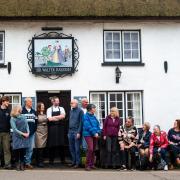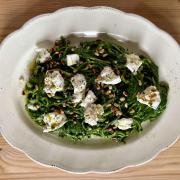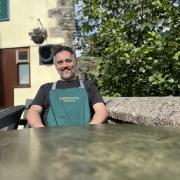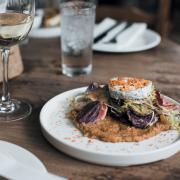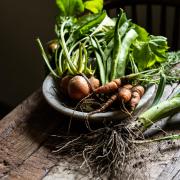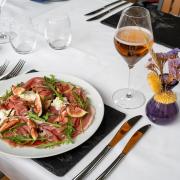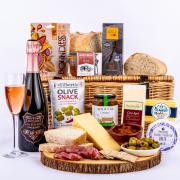Think of a roast and the traditional Sunday lunch comes to mind, but in River Cottage Roasts chef Gelf Alderson reveals how we can harness the power of the oven to create a whole new world of one-tray wonders, from breakfast to puddings and everything in between.

Smoked haddock with potatoes, spinach, cream and thyme recipe
I love smoked fish and I’m fortunate enough to be able to smoke my own, but I appreciate this is unusual. Most good fishmongers and supermarket fish counters sell naturally smoked fish, which is pale yellow in colour. Avoid anything that is bright yellow, as this will have been dyed and most likely dipped in a smoke-flavoured cure rather than smoked properly. If you have any leftovers (which I doubt), thin down with a little stock the next day for a hearty chowder-like lunch.
Serves 4
Ingredients
500g new potatoes (skin on)
2 tbsp extra virgin olive oil
2 leeks, trimmed and cut into 1cm slices
5 sprigs of thyme
200g spinach (tougher stalks removed and roughly chopped if using large leaf spinach)
400g MSC-certified smoked haddock fillets (or any smoked sustainably caught white fish), pin-boned and skinned
400ml double cream
A small glass of dry white wine
50g mature cheddar, grated
20g pumpkin seeds
A pinch of paprika
Sea salt and freshly cracked black pepper
Method
Preheat the oven to 220°C/Gas 7.
Put the new potatoes into an ovenproof pan or roasting tray. Trickle over the extra virgin olive oil, season lightly with salt and pepper and toss to coat. Cook in the oven for 25–30 minutes until the potatoes are just softened all the way through.
Take the pan out and use the back of a fork to just break each potato. Add the leeks and thyme, stir and cook in the oven for 10 minutes. Now add the spinach and return to the oven for a couple of minutes until it is just wilted.
In the meantime, cut the fish into 2cm cubes. Remove the pan from the oven and add the smoked haddock, cream and white wine. Stir together and return to the oven for 12–15 minutes, until the fish is cooked.
Take out the pan again and turn the oven setting up to 230°C/Gas 8. Sprinkle over the grated cheese, then the pumpkin seeds and paprika. Return to the oven for a few minutes until the cheese is melted and starting to brown. Serve at once.
Swaps
This works well if you replace the smoked fish with small or halved larger chestnut mushrooms.

Cabbage, carrots and shallots with hazelnut satay recipe
Cabbage is the star of the show here. I love roasting this vegetable as it intensifies the flavour to give a wonderful nutty taste, especially if you get some good colour on the cut edges. The satay sauce is the ideal complement – I’m using hazelnut butter here, but any nut or seed butter will do. It’s an excellent accompaniment to the roast chicken.
Serves 4 (generously)
Ingredients
450g carrots
250g shallots, peeled
3 tbsp cold-pressed rapeseed oil
1 large or 2 small pointed (hispi) cabbage(s), outer leaves removed
Sea salt and freshly cracked black pepper
For the satay
1 lime, finely grated zest and juice
1 tsp honey
2 tbsp tamari (or soy sauce)
2 tbsp good-quality, medium-hot curry powder
3 tbsp hazelnut butter (or peanut butter)
400ml coconut milk
To finish
5 sprigs of mint, leaves picked and roughly torn
A small bunch of coriander, leaves picked and roughly chopped
Method
Preheat the oven to 220°C/Gas 7.
Put the new potatoes into an ovenproof pan or roasting tray. Trickle over the extra virgin olive oil, season lightly with salt and pepper and toss to coat. Cook in the oven for 25–30 minutes until the potatoes are just softened all the way through.
Take the pan out and use the back of a fork to just break each potato. Add the leeks and thyme, stir and cook in the oven for 10 minutes. Now add the spinach and return to the oven for a couple of minutes until it is just wilted.
In the meantime, cut the fish into 2cm cubes. Remove the pan from the oven and add the smoked haddock, cream and white wine. Stir together and return to the oven for 12–15 minutes, until the fish is cooked.
Take out the pan again and turn the oven setting up to 230°C/Gas 8. Sprinkle over the grated cheese, then the pumpkin seeds and paprika. Return to the oven for a few minutes until the cheese is melted and starting to brown. Serve at once.
Swaps
This works well if you replace the smoked fish with small or halved larger chestnut mushrooms.

Fig, fennel and brandy cobbler recipe
Figs are an opulent fruit, packed full of flavour, and when you add a little brandy to them you have a real powerhouse on your hands. Try and select figs that are just ripe – if they feel overly soft, it can be a sign that they have started to rot.
Serves 4
Ingredients
12 fresh figs (about 750g)
50ml Somerset cider brandy
2 tsp fennel seeds
2 tbsp dark muscovado sugar
For the cobbler topping
150g plain wholemeal flour
90g self-raising white flour
1 tsp baking powder
1 tsp ground cardamom
100g ground almonds
50g cold butter, diced
50g dark muscovado sugar
1 medium egg
50ml milk
50ml Somerset cider brandy
Flaked almonds, to finish (optional)
To serve
Custard, pouring cream or natural yoghurt, to serve
Method
Preheat the oven to 180°C/Gas 4.
Cut a 2cm cross in the top of each fig, then stand the figs in a fairly small roasting tray – there should be a 2cm clearance above the figs and about 1cm in between them.
Sprinkle over the cider brandy, fennel seeds and sugar and cook in the oven for 10 minutes.
Meanwhile, make the cobbler topping. Put the flours, baking powder, cardamom, ground almonds, butter and sugar into a large bowl and rub together until the mixture is the consistency of breadcrumbs. Add the egg, milk and cider brandy and mix quickly to form a dough; don’t overwork as this will lead to a heavy cobbler.
Remove the roasting tray from the oven and drop the cobbler mix around the figs, leaving their tops exposed.
Sprinkle over the flaked almonds, if using. Return the tray to the oven and cook for 30 minutes or until the cobbler is risen and golden and a skewer poked into one of its thicker parts comes away clean.
Serve the fig cobbler hot, with custard, cream or yoghurt.
Swaps
Replace the figs with 6 peaches, halved and de-stoned, keeping the rest of the ingredients the same.







